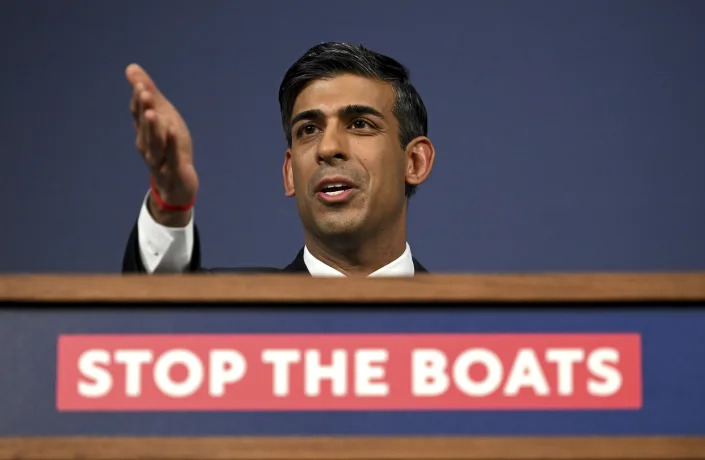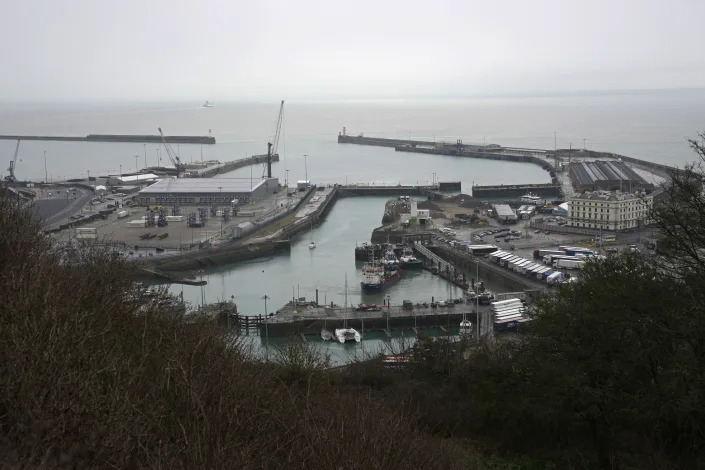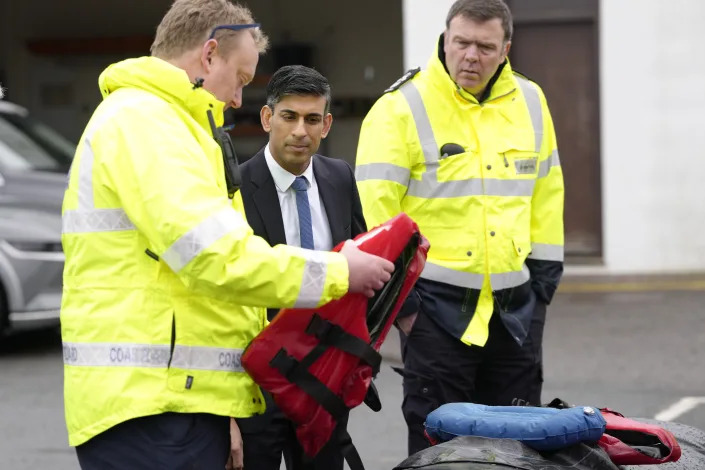No-one with concern for fellow humans should back migration Bill – Sturgeon
Craig Paton, PA Scotland Deputy Political Editor
Thu, 9 March 2023
Craig Paton, PA Scotland Deputy Political Editor
Thu, 9 March 2023
Nicola Sturgeon
5th First Minister of Scotland and Leader of the Scottish National Party
No-one who has concern for their fellow human beings should back the UK Government’s Illegal Migration Bill, Nicola Sturgeon has said.
Home Secretary Suella Braverman this week outlined plans to prevent anyone who comes to the UK through illegal means from staying in the country.
The move was immediately denounced by politicians within and outside the UK, with the UN’s refugee agency claiming it amounts to an effective “asylum ban”.
On Thursday, outgoing Scottish First Minister Nicola Sturgeon weighed into the controversy, saying the Scottish Government would “never support” such a Bill.
During First Minister’s Questions, she said: “Let’s be clear – the UK Government’s Illegal Migration Bill sets out a clear intention to remove the right to seek refugee protection in the United Kingdom, it is utterly shameful and immoral.
“All of us, without exception, should be appalled that the Home Secretary should introduce such a Bill, a Bill that she knows doesn’t comply with the Human Rights Act, a Bill which adds to the damage already inflicted on the UK’s reputation as a place of refuge, the UK’s credibility with international partners and the ability to meet responsibilities under the refugee convention and the European Convention on Human Rights.
“It is a Bill that this Government does not support, will never support, and nobody who has any concern for our fellow human beings should ever support such an appalling piece of draft legislation.”
The First Minister also hit out at the opposition, adding: “I can still remember a day when Labour would have opposed it tooth and nail in principle and not in the mealy-mouthed way that it has been doing.”
Why are migrants in small boats a heated issue in the UK?


Suella Braverman




Britain's Prime Minister Rishi Sunak, second center, speaks with members of the Home Office contracted staff, while looking at a lifevest and rubber dinghy, during a visit to a Home Office joint control room in Dover, Kent, England, Tuesday, March 7, 2023.




Britain's Prime Minister Rishi Sunak, second center, speaks with members of the Home Office contracted staff, while looking at a lifevest and rubber dinghy, during a visit to a Home Office joint control room in Dover, Kent, England, Tuesday, March 7, 2023.
(AP Photo/Kirsty Wigglesworth, Pool)
JILL LAWLESS
Wed, March 8, 2023
LONDON (AP) — The message to asylum-seekers from British Home Secretary Suella Braverman was stark. “If you enter Britain illegally, you will be detained and swiftly removed.”
The government hopes that decisive — and divisive — measure will stop tens of thousands of migrants reaching Britain in boats across the English Channel.
Behind the tough talk, however, lie a host of legal, practical and ethical questions. Condemned by rights groups and queried by legal experts, the Illegal Migration Bill is the latest in a long line of British government efforts to control unauthorized migration.
IS THIS A NEW PROBLEM?
The issue is neither new nor unique to the U.K. War, famine, poverty and political repression have put millions on the move around the globe. Britain receives fewer asylum-seekers than European nations including Italy, Germany and France — nine per 100,000 people in 2021, compared to a European Union average of 16 per 100,000.
But for decades, thousands of migrants have traveled to northern France each year in hopes of reaching the U.K. Many are drawn by family ties, the English language or the belief it’s easy to find work in the U.K.
After the Eurotunnel connecting France and England under the Channel opened in 1994, refugees and migrants congregated in Calais, the nearest French city, in hopes of stowing away on vehicles heading to Britain. They gathered in crowded makeshift camps, including a sprawling, violent settlement dubbed “The Jungle.”
Neither repeated sweeps to shut down the camps nor increased security patrols stopped the flow of people.
WHY ARE PEOPLE NOW CROSSING BY BOAT?
When the COVID-19 pandemic all but halted rail, air and ship travel and disrupted freight transport in 2020, people-smugglers began to put migrants into inflatable dinghies and other small boats. In 2018, only 300 people reached Britain that way. The number rose to 8,500 in 2020, 28,000 in 2021 and 45,000 in 2022.
Dozens have died in the frigid channel, including 27 people in a single sinking in November 2021.
The new arrivals are much more visible than those arriving by air or as truck stowaways. Groups of migrants arrive almost daily on beaches or in lifeboats along England’s southern coast, sending the asylum issue up the news and political agenda.
WHO IS IN THE BOATS?
The British government says many of those making the journey are economic migrants rather than refugees, and points to an upswing last year in arrivals from Albania, a European country that the U.K. considers safe.
The other main countries of origin last year were Afghanistan, Iran, Iraq and Syria. Of those whose applications have been processed, a large majority were granted asylum in the U.K.
HOW HAS THE U.K. GOVERNMENT RESPONDED?
Britain’s Conservative Party, in power since 2010, has brought in a series of measures aimed at deterring the channel crossings.
The U.K. has struck a series of deals with France to increase patrols of beaches and share intelligence in an attempt to disrupt smuggling gangs — all of which have had only a limited impact.
Last year Britain announced a deal with Rwanda to send migrants arriving by boat on a one-way trip to the East African country, where their asylum claims would be heard and, if successful, they would stay. The policy was condemned by human rights groups an is mired in legal challenges. No one has yet been sent to Rwanda.
The 2022 Nationality and Borders Act barred people from claiming asylum in Britain if they had passed through a safe country such as France. But in practice it has made little difference, since people fleeing war and persecution can’t be sent home, and no countries — other than Rwanda and Albania — have agreed to take deportees.
This week Britain unveiled the Illegal Migration Bill, its toughest measure yet, which calls for people arriving by unauthorized routes to be detained, deported to their homeland or “a safe third country” and banned from ever reentering the U.K.
WILL IT WORK?
The United Nations refugee agency says the bill amounts to an “asylum ban” and is a clear breach of the U.N. refugee convention. The U.K. government acknowledges the bill may break Britain’s international human rights commitments, and says it expects legal challenges.
Sunder Katwala, head of the identity and immigration think-tank British Future, said in a blog post that “the pledge to detain and remove all people who cross the Channel has no prospect of being honored in the next two years.” He said that apart from legal issues, the government “doesn’t have enough detention places; and it cannot deport everyone when it doesn’t have agreements with other countries to do so safely.”
The British government says the country’s asylum system has been “overwhelmed” by the small-boat arrivals. But critics blame a bureaucratic and cumbersome asylum system, exacerbated by the pandemic, that has amassed a backlog of 160,000 applications.
Brexit has also played a role: it has made it harder for Britain to send migrants to other European countries and has cut off U.K. access to some EU-wide information databases.
The government has vowed to push the bill into law, saying the British public wants to see tough action. “Stopping the boats is not just my priority, it is the people’s priority,” Prime Minister Rishi Sunak said Wednesday.
Evidence suggests the public’s view is mixed. A desire to control immigration was a huge factor behind the U.K.’s 2016 vote to pull out of the European Union. But overall immigration rose, rather than fell, after Brexit, hitting a record high of more than 500,000 in the year to June 2022. Britain also took in a record number of refugees last year, including 160,000 from Ukraine and 150,000 from Hong Kong.
At the same time, polls suggest immigration is no longer a top issue for many voters. Jonathan Portes, senior fellow at the think-tank U.K. in a Changing Europe, said there has been a “sustained shift towards more positive attitudes towards migration” since Brexit.
As for asylum-seekers, he said Britons want the country to be “relatively generous towards genuine refugees. But how that is defined is highly contested.” ___
Follow AP’s coverage of global migration at https://apnews.com/hub/migration
JILL LAWLESS
Wed, March 8, 2023
LONDON (AP) — The message to asylum-seekers from British Home Secretary Suella Braverman was stark. “If you enter Britain illegally, you will be detained and swiftly removed.”
The government hopes that decisive — and divisive — measure will stop tens of thousands of migrants reaching Britain in boats across the English Channel.
Behind the tough talk, however, lie a host of legal, practical and ethical questions. Condemned by rights groups and queried by legal experts, the Illegal Migration Bill is the latest in a long line of British government efforts to control unauthorized migration.
IS THIS A NEW PROBLEM?
The issue is neither new nor unique to the U.K. War, famine, poverty and political repression have put millions on the move around the globe. Britain receives fewer asylum-seekers than European nations including Italy, Germany and France — nine per 100,000 people in 2021, compared to a European Union average of 16 per 100,000.
But for decades, thousands of migrants have traveled to northern France each year in hopes of reaching the U.K. Many are drawn by family ties, the English language or the belief it’s easy to find work in the U.K.
After the Eurotunnel connecting France and England under the Channel opened in 1994, refugees and migrants congregated in Calais, the nearest French city, in hopes of stowing away on vehicles heading to Britain. They gathered in crowded makeshift camps, including a sprawling, violent settlement dubbed “The Jungle.”
Neither repeated sweeps to shut down the camps nor increased security patrols stopped the flow of people.
WHY ARE PEOPLE NOW CROSSING BY BOAT?
When the COVID-19 pandemic all but halted rail, air and ship travel and disrupted freight transport in 2020, people-smugglers began to put migrants into inflatable dinghies and other small boats. In 2018, only 300 people reached Britain that way. The number rose to 8,500 in 2020, 28,000 in 2021 and 45,000 in 2022.
Dozens have died in the frigid channel, including 27 people in a single sinking in November 2021.
The new arrivals are much more visible than those arriving by air or as truck stowaways. Groups of migrants arrive almost daily on beaches or in lifeboats along England’s southern coast, sending the asylum issue up the news and political agenda.
WHO IS IN THE BOATS?
The British government says many of those making the journey are economic migrants rather than refugees, and points to an upswing last year in arrivals from Albania, a European country that the U.K. considers safe.
The other main countries of origin last year were Afghanistan, Iran, Iraq and Syria. Of those whose applications have been processed, a large majority were granted asylum in the U.K.
HOW HAS THE U.K. GOVERNMENT RESPONDED?
Britain’s Conservative Party, in power since 2010, has brought in a series of measures aimed at deterring the channel crossings.
The U.K. has struck a series of deals with France to increase patrols of beaches and share intelligence in an attempt to disrupt smuggling gangs — all of which have had only a limited impact.
Last year Britain announced a deal with Rwanda to send migrants arriving by boat on a one-way trip to the East African country, where their asylum claims would be heard and, if successful, they would stay. The policy was condemned by human rights groups an is mired in legal challenges. No one has yet been sent to Rwanda.
The 2022 Nationality and Borders Act barred people from claiming asylum in Britain if they had passed through a safe country such as France. But in practice it has made little difference, since people fleeing war and persecution can’t be sent home, and no countries — other than Rwanda and Albania — have agreed to take deportees.
This week Britain unveiled the Illegal Migration Bill, its toughest measure yet, which calls for people arriving by unauthorized routes to be detained, deported to their homeland or “a safe third country” and banned from ever reentering the U.K.
WILL IT WORK?
The United Nations refugee agency says the bill amounts to an “asylum ban” and is a clear breach of the U.N. refugee convention. The U.K. government acknowledges the bill may break Britain’s international human rights commitments, and says it expects legal challenges.
Sunder Katwala, head of the identity and immigration think-tank British Future, said in a blog post that “the pledge to detain and remove all people who cross the Channel has no prospect of being honored in the next two years.” He said that apart from legal issues, the government “doesn’t have enough detention places; and it cannot deport everyone when it doesn’t have agreements with other countries to do so safely.”
The British government says the country’s asylum system has been “overwhelmed” by the small-boat arrivals. But critics blame a bureaucratic and cumbersome asylum system, exacerbated by the pandemic, that has amassed a backlog of 160,000 applications.
Brexit has also played a role: it has made it harder for Britain to send migrants to other European countries and has cut off U.K. access to some EU-wide information databases.
The government has vowed to push the bill into law, saying the British public wants to see tough action. “Stopping the boats is not just my priority, it is the people’s priority,” Prime Minister Rishi Sunak said Wednesday.
Evidence suggests the public’s view is mixed. A desire to control immigration was a huge factor behind the U.K.’s 2016 vote to pull out of the European Union. But overall immigration rose, rather than fell, after Brexit, hitting a record high of more than 500,000 in the year to June 2022. Britain also took in a record number of refugees last year, including 160,000 from Ukraine and 150,000 from Hong Kong.
At the same time, polls suggest immigration is no longer a top issue for many voters. Jonathan Portes, senior fellow at the think-tank U.K. in a Changing Europe, said there has been a “sustained shift towards more positive attitudes towards migration” since Brexit.
As for asylum-seekers, he said Britons want the country to be “relatively generous towards genuine refugees. But how that is defined is highly contested.” ___
Follow AP’s coverage of global migration at https://apnews.com/hub/migration
No comments:
Post a Comment